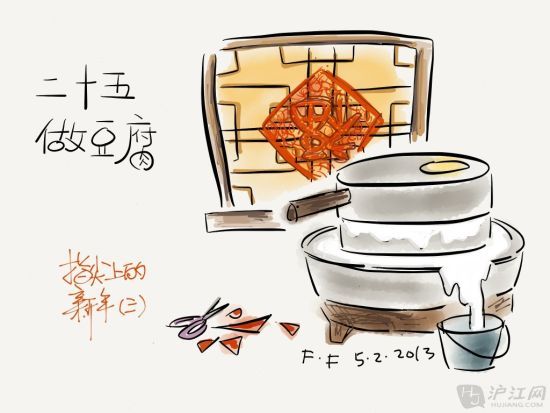春节趣味习俗:腊月二十五推磨做豆腐(双语)
 腊月二十五推磨做豆腐
腊月二十五推磨做豆腐The 25th day of the 12th month in Lunar Calendar: The folk saying goes like 腊月二十五,推磨做豆腐。
腊月二十五,俗语说“腊月二十五,推磨做豆腐”。
Why make 豆腐 (dou fu, beancurd, or tofu )?
但是为什么是做“豆腐”呢?
As for the food itself, tofu is a very good substitution for meat. In the old days, poor people always looked forward to a feast of meat on New Year.However, they were often too poor to afford one. So they turned to tofu, which was ‘in between’ meat and vegetables and they could make various dishes from it instead of meat。
就豆腐本身而言,是取代肉类不错的选择,在过去,穷苦的人们总是盼望着在新年吃上一顿好的。但是,肉类对于穷苦的人家来说并不是承担得起的,所以他们就会选择豆腐,豆腐是介于肉与蔬菜之间的食品,可以制作不同的菜式,而取代肉类。
Of course, there is a symbolic reason. The Chinese word 腐 has a similar pronunciation with the word of 福 ( fu, happiness) and 富 ( fu, wealth). Making tofu also means welcoming happiness and a good harvest in the new year。
当然,“做豆腐”也有象征性的意义。中文“腐”与“福”有相似的发音,做豆腐也就意味着“在新年收获幸福以及福气”。
Nowadays, people will not make their own tofu and they have many other choices of food. It is very common to see Chinese people pasting a paper cutting work of the Chinese character of 福 up side down on the window or door. By doing this, they actually express the same idea of welcoming happiness to their house。
如今,人们并不会自己做豆腐,他们会有更多别的选择,非常常见的有,中国人常把剪好的“福”字倒着贴在窗户或者门上,这样,人们也表达了同样的意思,希望“幸福福气”来到他们的家。
文化链接:
更多关于“腊月二十五 推磨做豆腐”的故事
民谚称:“腊月二十五,推磨做豆腐。”
据考证,豆腐是西汉淮南王刘安发明的。南宋朱熹在其《豆腐》诗中写到:“种豆豆苗稀,力竭心已腐,早知淮南术,安坐获泉布。”
有趣的是,一些地方还有在除夕以前吃豆腐渣的风俗。究其因,是当地传说灶王上天汇报后,玉帝会下界查访,看各家各户是否如灶王所奏的那样,于是各家各户就吃豆腐渣以表示清苦,瞒过玉皇的惩罚。传说归传说,吃豆腐渣实则是古代生产力低下,没有那么多好吃的,同时也是先民勤俭节约美德的写照。
(沪江英语)
- 双语:春节习俗 过年缺不了的8件事儿(图)2015-02-02 17:00
- 双语:休养生息 孩子一天睡足几小时最健康2015-02-04 10:03
- 春节必备口语:恭喜发财 红包拿来(双语)2015-02-04 09:47
- 少儿英语:2015羊年英文春节祝福语(图)2015-02-03 18:21
- 羊年吉祥:盘点春节必用英语词汇(图)2015-02-02 10:27

